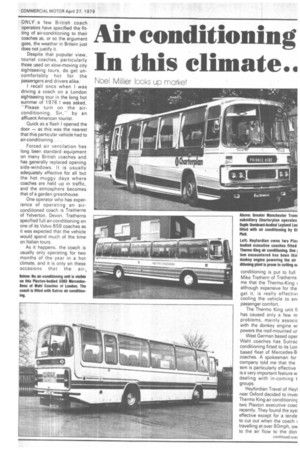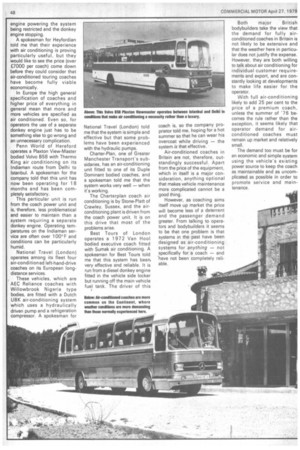Air conditioning In this climate..
Page 49

Page 50

If you've noticed an error in this article please click here to report it so we can fix it.
Noel Miller looks up market
ONLY a few British coach operators have specified the fitting of air-conditioning to their coaches as, or so the argument goes, the weather in Britain just does not justify it.
Despite that popular view, tourist coaches, particularly those used on &ow-moving city sightseeing tours, do get uncomfortably hot for the passengers and drivers alike.
I recall once when I was driving a coach on a London sightseeing tour in the long hot summer of 1976 I was asked, "Please turn on the airconditioning, Sir," by an affluent American tourist.
Quick as a flash I opened the door — as this was the nearest that this particular vehicle had to air-conditioning . . .
Forced air ventilation has long been standard equipment on many British coaches and has generally replaced opening side-windows. It is usually adequately effective for all but the hot muggy days where coaches are held up in traffic, and the atmosphere becomes that of a garden greenhouse.
One operator who has experience of operating an airconditioned coach is Tratherns of Yelverton, Devon. Tratherns specified full air-conditioning on one of its Volvo B58 coaches as it was expected that the vehicle would spend much of the time on Italian tours.
As it happens, the coach is usually only operating for two months of the year in a hot climate, and it is only on these occasions that the air-, conditioning is put to full Mike Trathern of Tratherns me that the Thermo-King although expensive for the get it, is really effectivi cooling the vehicle to en: passenger comfort.
The Thermo King unit fi has caused only a few m problems, mainly associ with the donkey engine w powers the roof-mounted ur West German based oper Wahl coaches. has Sutrac conditioning fitted to its Lon based fleet of Mercedes-B coaches. A spokesman for company told me that the tem is particularly effective is a very important feature w dealing with in-coming t groups.
Heyfordian Travel of Heyl near Oxford decided to inveE Thermo King air conditioninc two Plaxton executive coac recently. They found the sys' effective except for a tende to cut out when the coach r travelling at over 60mph, ovv to the air flow to the don engine powering the system being restricted and the donkey engine stopping.
A spokesman for Heyfordian told me that their experience with air conditioning is proving particularly useful, but they would like to see the price (over 0000 per coach) come down before they could consider that air-conditioned touring coaches have become fully viable economically.
in Europe the high general specification of coaches and higher price of everything in general mean that more and more vehicles are specified as air conditioned. Even so, for operators the use of a separate donkey engine just has to be something else to go wrong and an unnecessary complication.
Penn World of Hereford operates a Plaxton View-Master bodied Volvo B58 with Thermo King air conditioning on its lndiaman route from Delhi to Istanbul. A spokesman for the company told that this unit has now been operating for 18 months and has been completely satisfactory.
This particular unit is run from the coach power unit and is, .therefore, less problematical and easier to maintain than a system requiring a separate donkey engine. Operating temperatures on the Indianian service are often over 100°F and conditions can be particularly humid.
National Travel (London) operates among its fleet four air-conditioned left-hand-drive coaches on its European longdistance services.
These vehicles, which are AEC Reliance coaches with Willowbrook Nigeria type bodies, are fitted with a Dutch UBK air-conditioning system 'which uses a hydraulically driven pump and a refrigeration compressor. A spokesman for National Travel (London) told me that the system is simple and effective but that some problems have been experienced with the hydraulic pumps, Charter-Plan, one of Greater Manchester Transport's subsidaries, has an air-conditioning unit fitted to one of its Duple Dominant bodied coaches, and a spokesman told me that the system works very well — when it's working.
The Charterplan coach air conditioning is by Stone-Platt of Crawley. Sussex, and the airconditioning plant is driven from the coach power unit. It is on this drive that most of the problems arise.
Best Tours of London operates a 1972 Van Hool bodied executive coach fitted with Surnak air conditioning. A spokesman for Best Tours told me that this system has been. very effective and reliable. It is run from a diesel donkey engine fitted in the vehicle side locker but running off the main vehicle fuel tank. The driver of this coach is, so the company proprietor told me, hoping for a hot summer so that he can wear his overcoat while driving — the system is that effective. • Air-conditioned coaches in Britain are not, therefore, outstandingly successful. Apart from the price of the equipment, which in itself is a major consideration, anything optional that makes vehicle maintenance more complicated cannot be a good thing.
However, as coaching aims itself move up market the price will become less of a deterrent and the passenger demand greater. From talking to operators and bodybuilders it seems to be that one problem is that systems in the past have been designed as air-conditioning systems for anything — not specifically for a coach — and 'have not been completely reliable. Both major British bodybuilders take the view that the demand for fully airconditioned coaches in Britain is not likely to be extensive and that the weather here in particular does not justify the expense. However, they are both willing to talk about air conditioning for individual customer requirements and export, and are constantly looking at developments to make life easier for the operator.
With full air-conditioning likely to add 25 per cent to the price of a premium coach, unless the summer of '76 becomes the rule rather than the exception, it seems likely that operator demand for airconditioned coaches must remain up market and relatively small.
The demand too must be for an economic and simple system using the vehicle's existing power source to keep the coach as maintainable and as uncomplicated as possible in order to promote service and maintenance.
















































































































































